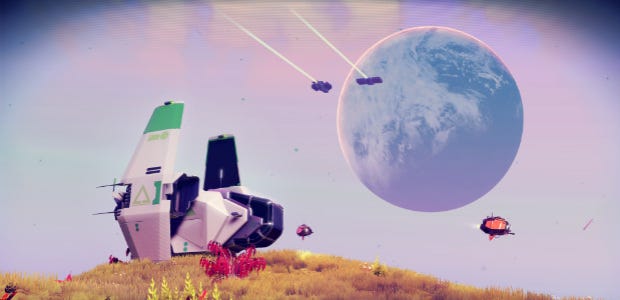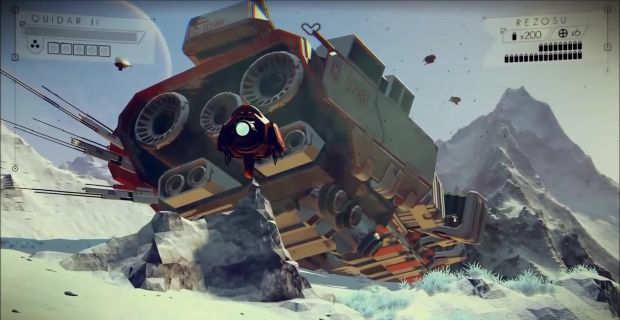The Broken Promise Of No Man’s Sky And Why It Matters
No Man's Whine
After years of waiting, No Man's Sky finally took off last week. For some, it soared above the clouds. For others, it crashed into a ditch and exploded. Our John had a rocky flight himself, saying that, while he was enjoying the journey, it was often infuriating. My own experience was one of disappointment. I didn't enjoy the focus on crafting, the endless menus, the lack of purpose to it all. But it was strange that I felt this let down. Then I went back and watched the early trailers and quickly realised that I was not playing the same game I had been shown.
Here’s an old video. Let’s take a look.
When you look at what's happening here, it's incredible. Alien animals are moving in vast herds, there are tall reptiles bathing in water, a large predator is knocking down trees in an attempt to attack or frighten another, prompting a panicked stampede – all interesting animal behaviour. The ship shoots into space and lands on another planet, virtually seamlessly.
But when you play the game as it is, the feeling of being on a planet - even a beautiful one with a lot of life - does not match this trailer. There are no stampeding herds, no beasts lounging in the nearest river (no rivers at all), no animals tearing up trees or muck. Subsequent trailers have the same problem. There are no giant sand worms, there are no huge shipwrecks on the planet’s surface, no low sweeps across the landscape. In fact, for a game that extols freedom, it's strange that your ship cannot fly lower than 50 metres without being forced to hover over an invisible barrier. There will be no races through narrow canyons here.
For many, the sense of disappointment people are feeling is simply due to public expectation spiraling out of control. The hype grew too great, the story goes, and no game could live up to it. Or: people didn't understand what the game was. While it’s true a lot of people invented a game in their heads called No Man’s Sky and then were baffled when that game didn’t appear, it’s also true that the game we were shown is not the same as the one we got. Much of what was shown or described in the hype years is wildly unrepresentative of what’s there now. Not just the inability to meet other players, even when you are within a few feet of each other. Or the landscape fizzling in around you (far from the seamless surface-to-space-and-back-to-surface demonstrations of early trailers). The entire atmosphere of the game seems to have changed. What once looked like a bracing adventure was now being described by many, often in the tone of apology, as a "quiet" game, a "relaxed" game.
In the videogames industry we are used to scripted marketing material being shown at E3 or GDC or Gamescom, packed with interesting stuff that changes radically by the time of the a game’s release. We all remember BioShock Infinite's fake trailers, which seemed like "gameplay" but were really only thinly-veiled first-person cinematics, none of which ended up in the final version. And because we have grown used to this type of advertising, a lot of people are shrugging when it comes to Hello Games' space-faring survival game. It is no different, you could say.
This is an narrow-minded and anti-consumer attitude. Just because every game developer under the quintillion suns does the same thing, does not make it OK. The right question to ask is: Why do we think this is an acceptable thing within our industry? Why are we prepared to buy into a intergalactic spectacle and then shrug off the discrepancies when that spectacle turns out to be only spectacle? To take one example, the animals of No Man's Sky, far from exhibiting any kind of complicated behaviour, are limited to two simplistic modes of being: hostile or non-hostile. You could replace all the animals on these planets, no matter how wonderfully weird they look, with two models - a nasty red blob, and a nice green blob - and it would not change how the game functions or how you react to this world (aside from making your screenshots folder more boring). It's a very shallow food chain.
It’s possible some of these features – like gargantuan creatures who live in the ground - are somewhere in the game, hidden deep in the universe, and they simply have not been discovered yet. It’s also possible that some features will be added later (Hello Games has already said it will be adding some form of basebuilding to the game in an upcoming patch). But neither of these possibilities excuse the game for its shortcomings as they are now. This isn't an early access title. The game is out, the game is expensive (and this is something I think a lot of us in the press often forget to factor into our thoughts when we get our free press copies) and we have to judge it based on what can be seen here and now. Reddit is already doing just that, in their characteristically crusading (sometimes inaccurate) way, by compiling a list of everything "missing" from the game.
When Aliens: Colonial Marines came out, revealing that all its pre-release footage was a complete misrepresentation, the press and public had a collective meltdown. That’s an extreme example, because A:CM was particularly awful and No Man’s Sky, by my judgement, is only dull. But we can look at either of these releases, side-by-side with their early trailers, and plainly see that something has been lost.
This isn’t about blaming the developers for dropping features – that happens to every game, it is entirely forgivable. We so fervently believe that programmers are magicians we sometimes forget they are fallible ones. But this is about calling developers and publishers out when any such “drops” aren’t adequately admitted before release. Later trailers for NMS did not show the giant sandworm, for instance, or low flights across the landscape, but this does not constitute “coming clean”. To admit that something has been stripped out, you have to explicitly say so, and you have to say it loudly.
There may be barriers to doing this, marketing teams to wrestle with, business and legal problems that get in the way, deadlines to meet. We often hear that there is a lot happening "under the surface" or "behind the scenes" at studios which prevent developers from being open about changes, features or other important news. But unless we know what these problems are, we can't judge them to be a fair reason or a foul excuse. It's the National Security fallacy. "I'm afraid I can't tell you that but, trust me, there is a good reason why."
It doesn't look good afterwards, in the cold light of post-release, to have neglected to mention all those deleted parts. And it's sometimes hard to see why creators would not mention these things. All it takes is a press release, an open letter, a video on the game's YouTube channel. And while it might be painful at the time to say, "listen guys, we had to take out the asteroid landing" it will be much less painful than the alternative - reaching the day of release and seeing the internet go into a frenzy, sending barrels of hatemail to your doorstep, tearing apart your digital baby. Things change, people will understand. But you have to tell them first.
One benefit of the early access model, for all its shortcomings, is that players see the game as it evolves. There's an immediate transparency. They can follow changes and cuts, even respond to them, and often hear from the developers themselves in regular updates, forums, and so on. A giant blockbuster hiding behind carefully released tidbits of information does not have this comfort. Neither does anyone being purposefully coy or spoiler-allergic. As flawed as the early access road is, it might have been better for Hello Games. Perhaps not monetarily - Sony's pushing of this game has ensured its best-selling status regardless of the critical response - but it may have resulted in a better game, and one closer to the vision set out in that first trailer.
There are some signs, however, that the dangers of hype are being recognised. As the game came closer to release, Hello Games and Sony seemed to understand that the build-up, far from being a boon, could actually be a problem. They began to show bits and pieces of what you would actually be doing on these colourful planets and space stations. And, while it began to feel more concrete, they were also too busy trying to tell everyone what No Man’s Sky actually was, that they forgot to tell the world what it wasn’t. What it didn’t have. It’s a matter of contradistinction. You can visualise an animal you’ve never seen before if someone tells you “it has wings” but you can understand it much better if they follow that up with: “...but it can’t fly.”
Future developers need to learn from this, just as future marketers do. But marketers are motivated by the bottom line and may not care if they are poisoning the industry with faux-gameplay trailers and hyper-ambitious promises. Developers, on the other hand, have a creative vision of their own and need to take care that it remains true, because it is not the marketing geezer's reputation on the line - it's the creators. In the case of Hello Games, the biggest marketer often was the developer, which might have been half the problem.
The thing to take away, though, is this: the more broken promises we have to endure, the more the videogames industry becomes like modern politics - a massive theatre that every contestant understands is composed of untruths and half-truths, and in which the best silver-tongue will always triumph. It is not that bad yet, at least, I don't think so. We are more at the mercy of excitable nerds than we are manipulative Trumps. But the culture of truth-bending gets worse with every successive E3.
Regardless of how it is being received, No Man's Sky will be remembered. Hopefully, for the right reason - not as a disappointment or a triumph - but as a lesson. You can take your audience for a soaring ride above the clouds, but you have to bring them back to earth every once in a while.

















